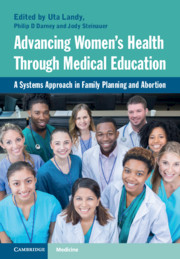 Advancing Women's Health Through Medical Education
Advancing Women's Health Through Medical Education from Section III - Family Planning Curricular Design & Implementation
Published online by Cambridge University Press: 30 July 2021
Milestones, which provide a narrative description of the knowledge, skills and attitudes that a learner must progressively demonstrate throughout their training in order to enter unsupervised practice, represent the most recent method by which learner competency is measured in US graduate medical education. Milestones were recently developed for the fellowship in Complex Family Planning using a Delphi approach. Milestone assessment and demonstration of competence necessitates a system involving the assessor, the learner and validated assessment tools which reflect the milestone content. Learners develop a milestone-based individualized learning plan, which is re-visited and adjusted every 6 months incorporating input from multiple assessors, collected and aggregated using healthcare education management software. We provide the newly developed fellowship milestones as an example of a process educators can use to create milestones for their unique learning programs. A similar system, incorporating mastery-based learning principles, can be implemented for procedural skills training outside of the traditional graduate medical education environment.
To save this book to your Kindle, first ensure [email protected] is added to your Approved Personal Document E-mail List under your Personal Document Settings on the Manage Your Content and Devices page of your Amazon account. Then enter the ‘name’ part of your Kindle email address below. Find out more about saving to your Kindle.
Note you can select to save to either the @free.kindle.com or @kindle.com variations. ‘@free.kindle.com’ emails are free but can only be saved to your device when it is connected to wi-fi. ‘@kindle.com’ emails can be delivered even when you are not connected to wi-fi, but note that service fees apply.
Find out more about the Kindle Personal Document Service.
To save content items to your account, please confirm that you agree to abide by our usage policies. If this is the first time you use this feature, you will be asked to authorise Cambridge Core to connect with your account. Find out more about saving content to Dropbox.
To save content items to your account, please confirm that you agree to abide by our usage policies. If this is the first time you use this feature, you will be asked to authorise Cambridge Core to connect with your account. Find out more about saving content to Google Drive.